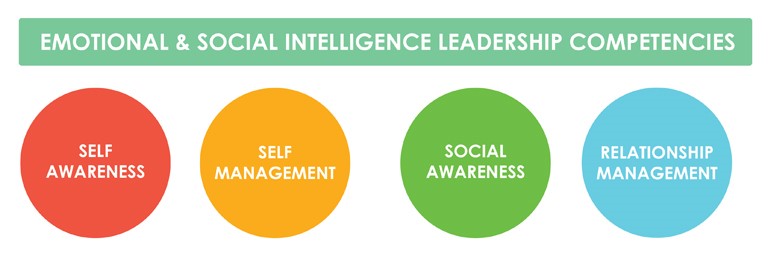As we approach 2020, we face new challenges when it comes to acquiring distinctive competencies in the workplace, even when we work in our own business, one of these competences, is:
-
Emotional and Social Intelligence.
Let us define this competence and explain its importance.
Emotional and Social Intelligence:
Emotional Intelligence is the capacity to recognize our own feelings and those of others, and to manage emotions effectively in ourselves and our relationships.

There are four parts, or domains, to the Emotional and Social Intelligence Leadership Competency Model developed by Daniel Goleman and Richard Boyatzis:
Emotional Self-Awareness:
The ability to understand our own emotions and their effects on our performance.
Emotional Awareness: Recognizing one’s emotions and their effects.
Accurate Self-Assessment: Knowing one’s strengths and limits.
Self-Confidence: A strong sense of one’s self-worth and capabilities
Emotional Self-Control:
The ability to keep disruptive emotions and impulses in check and maintain our effectiveness under stressful or hostile conditions.
Emotional Self-Control: Keeping disruptive emotions and impulses in check.
Transparency: Maintaining integrity, acting congruently with one’s values.
Adaptability: Flexibility in handling change.
Achievement: Striving to improve or meeting a standard of excellence.
Initiative: Readiness to act on opportunities.
Optimism: Persistence in pursuing goals despite obstacles and setbacks.
Social Awareness:
Refers to how people handle relationships and awareness of others’ feelings, needs, and concerns. The Social Awareness cluster contains three competencies.
Empathy: Sensing others’ feelings and perspectives, and taking an active interest in their concerns.
Organizational Awareness: Reading a group’s emotional currents and power relationships.
Service Orientation: Anticipating, recognizing, and meeting customers’ needs.
Relationship Management:
Concerns the skill or adeptness at inducing desirable responses in others. The Relationship Management cluster contains six competencies.
Developing Others: Sensing others’ development needs and bolstering their abilities.
Inspirational Leadership: Inspiring and guiding individuals and groups.
Change Catalyst: Initiating or managing change.
Influence: Wielding effective tactics for persuasion.
Conflict Management: Negotiating and resolving disagreements.
Teamwork & Collaboration: Working with others toward shared goals. Creating group synergy in pursuing collective goals.
Emotional Intelligence is closely related to personal and professional development, it impacts on more than how we manage our behavior and navigate social complexities, it also affects how we make decisions.
Superior emotional intelligence is an important element in the prevention of decision making based on emotional biases, whereas lower EI can create anxiety and lead to poor decisions. It’s not about removing emotions completely from the decision-making process, rather it’s about recognizing the emotions that are unrelated to the problem and not allowing them to be influential to the final result.
To see a range of our offered courses on Emotional and Social Intelligence, visit http://l2s.net/self-development-courses/
About the Author

